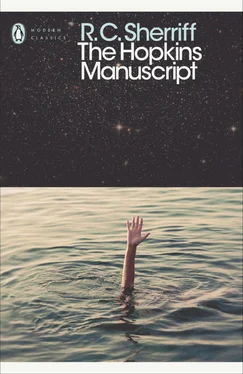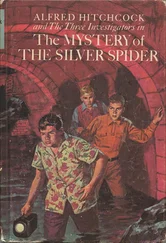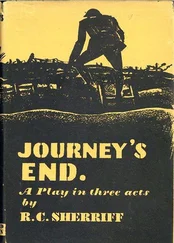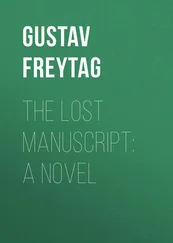Роберт Шеррифф - The Hopkins Manuscript
Здесь есть возможность читать онлайн «Роберт Шеррифф - The Hopkins Manuscript» весь текст электронной книги совершенно бесплатно (целиком полную версию без сокращений). В некоторых случаях можно слушать аудио, скачать через торрент в формате fb2 и присутствует краткое содержание. Год выпуска: 2018, ISBN: 2018, Издательство: Penguin Books, Жанр: sf_postapocalyptic, humor_satire, на английском языке. Описание произведения, (предисловие) а так же отзывы посетителей доступны на портале библиотеки ЛибКат.
- Название:The Hopkins Manuscript
- Автор:
- Издательство:Penguin Books
- Жанр:
- Год:2018
- ISBN:978-0-241-34908-3
- Рейтинг книги:4 / 5. Голосов: 1
-
Избранное:Добавить в избранное
- Отзывы:
-
Ваша оценка:
- 80
- 1
- 2
- 3
- 4
- 5
The Hopkins Manuscript: краткое содержание, описание и аннотация
Предлагаем к чтению аннотацию, описание, краткое содержание или предисловие (зависит от того, что написал сам автор книги «The Hopkins Manuscript»). Если вы не нашли необходимую информацию о книге — напишите в комментариях, мы постараемся отыскать её.
The Hopkins Manuscript — читать онлайн бесплатно полную книгу (весь текст) целиком
Ниже представлен текст книги, разбитый по страницам. Система сохранения места последней прочитанной страницы, позволяет с удобством читать онлайн бесплатно книгу «The Hopkins Manuscript», без необходимости каждый раз заново искать на чём Вы остановились. Поставьте закладку, и сможете в любой момент перейти на страницу, на которой закончили чтение.
Интервал:
Закладка:
The horrible part of it was that I had no idea – no conception of the sum that I should be forced to pay. Too late I realised that I might at least have compromised by limiting the extent of my guarantee. I had failed to do so, and a hundred tragic possibilities loomed like spectres before my sleepless eyes on that last night before the meeting.
Supposing the Committee had become involved in some hideous law-suit? Supposing, in the course of altering that building for the observatory, the roof had collapsed, killing men beneath and causing untold damage? The liability of the Committee was my liability: I visualised claims running into thousands and a sickening twist of my brain suddenly presented an even more terrible fate than financial ruin. If my whole fortune failed to meet the heavy claims I might be convicted of false pretences and imprisoned, for fifty honest witnesses could be brought forward to prove that I had guaranteed the Society’s losses without limit!
The loss of my fortune seemed now a little thing compared with this new, ghastly possibility. I think I was near to madness upon that awful night. I truly believe that I should have lost my reason had nature not stepped in to give me a few hours of restless stupor.
So dawned that Thursday: that fateful day of 8th October – the day that was to end everything of tranquillity and happiness that life had given me.
It was a lovely autumn morning, filled with a pale, crisp sunlight. Frost sparkled the meadows and rimed the hedgerows as I dragged my weary limbs down the hillside to feed my pullets. Now that the day of the meeting was upon me I felt a curious repose – a philosophy that gently dethroned my worldly troubles and prepared me to face my fate with dignity.
To retain my peace of mind I clipped the yew trees of my arbour, although within my heart I no longer thought of those sturdy trees as mine. At midday I returned to the house. I dressed myself with care in the blue suit which I kept for business occasions, ate a light lunch of sweetbreads and braised celery and walked to the station to catch the 2.14.
As the train ran through the familiar, sunlit countryside, I recalled many a happy journey to past meetings of the British Lunar Society and sadly reflected that this might be my last. If, as I now felt certain, the observatory scheme had failed, I knew that I could never again face those jeering men who would say: ‘I told you so.’ I recalled hot summer evenings with the Society’s windows wide to a twilit sky and the drowsy hum of traffic floating up to us – and evenings when the big fire blazed behind the President’s table and I had trudged home through the snow – happy evenings that would never come again.
I was too restless to make my usual visit to a cinema theatre when I arrived in London. I walked up Regent Street and along Oxford Street, blind to the happy, home-going crowds of London workers. Although the night was cold I sat for a while upon a seat in Hyde Park, hunched grimly in my greatcoat, counting the minutes that hung like lead.
Towards six o’clock I began to make my way towards our headquarters in Barbara Street. I had no desire to arrive too early and stand through an agony of suspense in the anteroom. I peered aimlessly into shop windows, timing myself to arrive at the doors at five minutes to six. I passed an old ragged man selling matches: I saw a little bunch of raw, shivering fingers protruding from a ragged mitten – and shuddered. In a little while, I, too, might be penniless and homeless.
But as I came within sight of our doorway I saw something that diverted my attention and stirred my anger. For who should be advancing from the opposite direction but Mr Winchelsea, a clever but mean little science master from a school at Hornsey who had been one of the most spiteful opponents of the observatory scheme, and who had been foremost in tormenting me with idiotic jokes about ‘my telescope’ at the past few meetings.
My first impulse was to turn upon my heel and pointedly walk away until he had gone in, but second thoughts urged me to show restraint and unconcern. I walked steadily forward and we entered almost together. In fact he waited for me and, to my great surprise, instead of giving me the malicious grin I had expected he nodded with a grave face, and said: ‘Good evening, Mr Hopkins. Keeping well?’
I was puzzled, but replied courteously and walked up the narrow steps beside him.
He said nothing until we had reached the floor beneath our lecture room, and then suddenly he turned his face towards me. Beneath the pale, unshaded lamp upon the landing I looked into the most haunted, piteous eyes that I have ever seen.
And when he spoke, his voice was high-pitched, almost hysterical.
‘It isn’t true, is it?’ he cried. ‘I mean – it’s only a silly mistake? – it must be – it’s impossible! I… I mean the greatest astronomers make absurd miscalculations, don’t they? DON’T THEY!…’
I was astounded. His last words came almost in a scream. Winchelsea, the one man above all others who should be gloating and chortling at the collapse of the telescope scheme, was actually trembling, and nearly hysterical with anxiety!
My first reaction gave me a gleam of respect for the man. It occurred to me that in his heart of hearts Winchelsea had longed for the success of the scheme as sincerely as I, and had only opposed it out of jealousy for my fighting speech.
But second thoughts made me sick with a new twist of horror. Supposing the scheme had collapsed more tragically than even I had anticipated? Supposing the Committee had by some means assessed my poor little fortune and realised that it was so far short of covering the loss that other Members must sacrifice their savings, too? I nearly fainted at the sight of Winchelsea’s thin, tragic face. He was a poor, struggling schoolmaster with a large family: every spare penny was needed for his children’s well-being. In that dark moment I saw myself not merely ruined financially, but ruined in character – the man whose reckless promise had dragged others to poverty and tragedy.
I saw myself, not merely the poor match-seller with the frozen, quivering fingers, but a convict in penal servitude with the ruin of my friends upon my conscience.
The reader may feel that I was taking an absurd, exaggerated view of my misfortune, but every normal, honest man will sympathise when he calls to mind how some trivial misfortune, such as a minor motoring offence, has preyed upon his mind until it has enlarged itself to tragedy.
I think it was the jovial voice of my old friend Dr Perceval, who had overtaken me on the stairs, that forced me to take a grip upon myself.
With a hearty clap upon my shoulder he cried out: ‘Hullo, old boy, how are the chickens?’
I stuttered a grateful reply, but I noticed that even the old doctor’s face was unusually grave and careworn as we ascended the last steps towards our lecture room.
My heart went out towards the old man as I walked beside him. Here at least was a stout friend who would stand by me and defend me. Here, too, was a man from whom I could at least secure some inkling of what lay in store for me…
I took him by the arm and drew him into the alcove at the head of the stairs.
‘Perceval,’ I said. ‘You’re on the Committee. Tell me the truth! Is it… is it very bad?’
The smile left his face and he answered with a curtness that I had never received from the genial old man before.
‘How did you know?’ he demanded.
I was angry. ‘I imagine I’ve a right to know,’ I snapped. He looked at me keenly and his eyes softened.
‘Of course you’ve a right. Every member has a right.’ He paused, then spoke with his eyes upon the moonlit window behind my head. ‘It is bad. The President will tell you everything – but it’s better to face it than stick our heads into the sand.’
Читать дальшеИнтервал:
Закладка:
Похожие книги на «The Hopkins Manuscript»
Представляем Вашему вниманию похожие книги на «The Hopkins Manuscript» списком для выбора. Мы отобрали схожую по названию и смыслу литературу в надежде предоставить читателям больше вариантов отыскать новые, интересные, ещё непрочитанные произведения.
Обсуждение, отзывы о книге «The Hopkins Manuscript» и просто собственные мнения читателей. Оставьте ваши комментарии, напишите, что Вы думаете о произведении, его смысле или главных героях. Укажите что конкретно понравилось, а что нет, и почему Вы так считаете.












